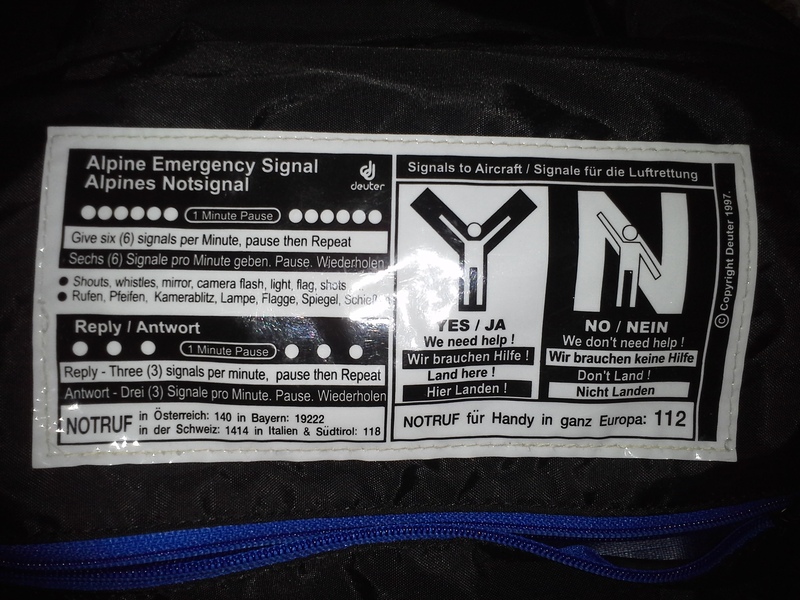True; but TBH we can't even agree to standardize the emergency phone numbers so are you really surprised?
Oh we can, pick up any connected phone on the planet, and dial 112. You *WILL* get emergency services.
Yep. Here the initial search is likely to be a ground search as well. As you said, no noise is likely to be heard by anybody in a search aircraft.
Our search aircraft vary by just who's doing the search:
-CAP (Civil Air Patrol)
www.gocivilairpatrol.com will be a small single engine fixed wing aircraft
-Coast Guard
www.uscg.mil can be anything from a small helicopter up to a C-130
-Local or State (Provincial in Canada) Law Enforcement (to include local city police, county sheriffs, and state/provincial Fish & Wildlife Enforcement) will likely be either a small helicopter or single engine fixed wing
How worrying... Perhaps I am spoilt in how well the Uk is served by MRT/SAR...
It is all about perspective and cultural differences.
More than you could possibly imagine

Here, if I used a whistle I would never expect to be found. Ever. We have no rescue like you have in the UK. Ours is planes only up here. No one would be able to look for you on foot. The communtiy where I live has only 3 others within 100 miles. There are no roads. Just forest, lakes and rivers for a thousand miles before you hit Hudson bay to the NE. No one lives there. I hunt traplines in winter (you cannot travel overland here in summer much) and when I trap on my own there is no one else near me or other hunters for hundred or more miles.
Here it depends a lot. If I was out on a hill, and lost or had an accident, I would start blowing a whistle. *BUT* it's not just the whistle that will get me found.
Option a) if I am very lucky, there is someone in ear shot that comes to find me.
Option b) I told a friend I would be back at 1700, at 1800 when they didn't hear from me they call 112 and ask for the police, then tell of an over due hiker. MRT/SAR are called, and they wander to where I told my friend I was going, or my last know position if I texted them my grid ref when I break camp, stop for lunch, and make camp (as I tend to do if I have signal). The MRT/SAR people will start their search following their training, at which point, I hope that one of them hears my whistle and comes to find me. If I fell over and hurt myself at 1500, I may have been doing 6 blasts every minute, and the MRT/SAR team don't hit the hill till 2000, yet, blast, blast, blast, blast, blast, blast, one minute, rinse repeart...
Option c) I had phone signal, I called 112 for help, I give them my grid ref, which is a 100m x 100m box, that I may have misread on the map, and thus they use the whistle to find me.
There are other options. But I'm pretty sure that in the situation you describe, none of them would work. If I was there, I would carry a PLB, and hope that someone can come find me.
I was thinking these were special whistles...... My fault, my written English isn't so good anymore.
They are. Most will be designed to meet the requirements of
ISO 12402-8.
Hey Julia, my friend in England told me that there were only lakes in England and that Lochs were in Scotland. But then I think he tells me other strange things I don't hear properly.

Thank you for all being patient, Wa'dji wannumin t'he'o
He is wrong. There is actually only one lake in the lake district. From
Wikipedia and more directly QI series E, episode 10, the only lake in the lake district is Bassenthwaite Lake. All the others are meres or waters or tarns. You get into some really fun pedantry at this point, especially if you happen to have a geologist or geograher present as to what is what type of body of water.
Oh, and just incase you thought it was truly insane, just remember, there is no such thing as a fish.
Lochs in Scotland and Ireland (lough is the Irish spelling)
Llynau (the plural of Llyn) in Wales
Tarns up north, and meres just about everywhere else. Water can also signify a lake as in Derwent Water for instance.
See previous statement, it's a damn site more blurry than that.
Largest lake in terms of volume of water is Loch Ness in Scotland, holds more water than all the other lakes in England and Wales combined. It is also very cold and makes for a bracing morning swim if you are so inclined, you might need the whistle to scare off Nessie though

Loch Ness isn't a lake, it's a Loch

Julia

